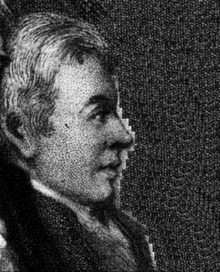Edward Charles Howard
| Edward Charles Howard FRS | |
|---|---|
 | |
| Born | 28 May 1774 |
| Died | 28 September 1816 (aged 42) |
| Nationality | British |
| Occupation | Chemist |
| Known for | "The first chemical engineer of any eminence" |
| Notable work | Analysis of the composition of iron meteorites |
| Awards |
Copley medal for his work on mercury (1800) Howardite |
Edward Charles Howard FRS (28 May 1774 – 28 September 1816)[1] the youngest brother of Bernard Howard, 12th Duke of Norfolk, was a British chemist who has been described as "the first chemical engineer of any eminence."[2]
In January 1799 he was elected a Fellow of the Royal Society and in 1800 awarded their Copley medal for his work on mercury.[3] He discovered mercury fulminate, a powerful primary explosive. In 1813 he invented a method of refining sugar which involved boiling the cane juice not in an open kettle, but in a closed vessel heated by steam and held under partial vacuum. At reduced pressure, water boils at a lower temperature, and so Howard's development both saved fuel and reduced the amount of sugar lost through caramelisation. The invention, known as Howard's vacuum pan, is still in use.
Howard also was interested in the composition of meteorites especially those of "natural iron". He found that many of these contained an alloy of nickel and iron that was not found on Earth, and thus they may have fallen from the sky. One type of meteorite is now known as Howardite.
See also
References
- ↑ Walker, William (1864). Memoirs of the distinguished men of science of Great Britain living in the years 1807–1808. London: E. & F. N. Spon. pp. 63–64.
- ↑ Transactions of the Institution of Chemical Engineers (1951), volume 29, page 163.
- ↑ "Library and Archive Catalogue". Royal Society. Retrieved 21 November 2010.
Further reading
- Kurzer, F. (1999). "The Life and Work of Edward Charles Howard". Annals of Science. 56 (2): 113–141. doi:10.1080/000337999296445.
- Howard, Edward (1800). "On a New Fulminating Mercury". Philosophical Transactions of the Royal Society of London. 90 (1): 204–238. JSTOR 107053. doi:10.1098/rstl.1800.0012.
- Sears, Derek W. (1976). "Edward Charles Howard and an early British contribution to meteoritics" (PDF). J. Brit. Astron. Assoc. 86: 133–139.